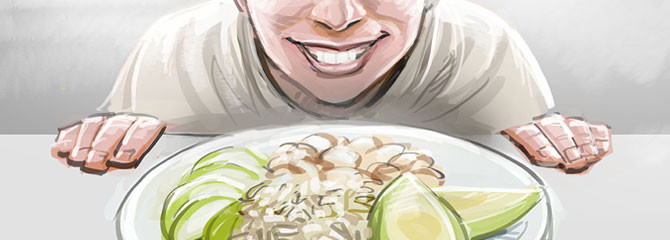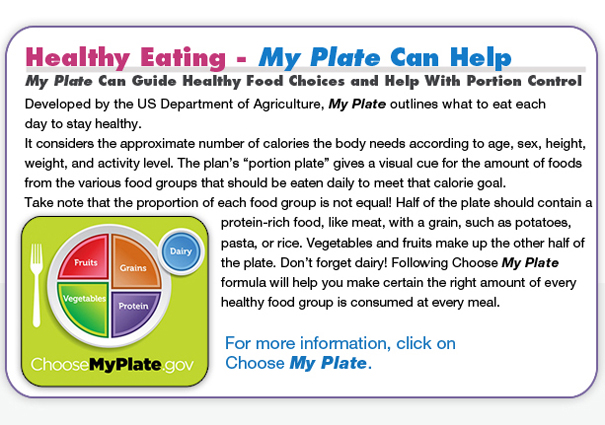Healthy Eating

Healthy Eating and Healthy Body Weight
This section of Next Step will cover:
Nutrition Matters
Eating healthy foods will keep your body strong, energized, and well nourished. It will also help you maintain a healthy weight. Eating lots of foods with extra fat, added sugar, and empty calories will pile on the pounds. And being overweight is an even bigger problem for people with bleeding disorders than it is for others. It puts extra stress on joints and actually increases the number of painful bleeds. And because body weight determines how much factor a person needs to treat a bleed, maintaining a healthy weight can decrease the amount of factor you need.
What Is a Healthy Diet?
Eating a variety of healthy foods will help you get the energy, protein, vitamins, minerals, and fiber you need to grow and be healthy.
Here are some ideas for eating healthy:
- Make half your grains whole. Choose whole-grain foods, such as whole-wheat bread, oatmeal, brown rice, and low-fat popcorn.
- Vary your veggies. Color your plate with all kinds of vegetables. Go dark green and orange with your vegetables. Eat spinach, broccoli, carrots, and sweet potatoes.
- Focus on fruits. Eat them at meals and snack time, too. Choose fresh, frozen, canned, or dried fruits. But go easy on fruit juice.
- Get your calcium-rich foods. To build strong bones and prevent tooth decay, drink 3 cups of low-fat or fat-free milk every day, and eat other calcium-rich foods, such as yogurt and cheese. Other good non-dairy sources of calcium are broccoli, dark leafy green vegetables, calcium-fortified foods (for example, orange juice, cereal, and bread), soy, beans, and canned fish.
- Go lean with protein. Eat lean or low-fat meat, chicken, turkey, and fish, or try adding naturally protein-rich beans and peas to dishes. Add chickpeas, nuts, or seeds to a salad; pinto beans to a burrito; or kidney beans to soup.
- Change your oil. We all need oil. Get yours from fish, nuts, and liquid oils such as corn, soybean, canola, and olive oil. These are considered better fats because they can help reduce cholesterol.
- Don't sugarcoat it. Choose foods and beverages that don't have sugar and sweeteners as one of their first ingredients. Added sugars contribute calories with few, if any, nutrients.
For nutritious ideas, go to Tips for Healthy Eating.

The Importance of Calcium
Bones grow rapidly during adolescence. For people with hemophilia, bone health may depend on several facts, including the number of joint bleeds. Children ages 9 to 15 years need calcium to build strong bones, prevent tooth decay, and fight bone loss later in life. However, many kids don't get the recommended daily amount of calcium. Try to drink 3 cups of low-fat or fat-free milk every day, and eat other calcium-rich foods. Calcium-rich foods include low-fat cheese and low-fat yogurt as well as dairy-free foods, such as calcium-fortified juice and cereals; beans; and dark green, leafy vegetables (spinach, broccoli, and bok choy). Be mindful that certain foods and beverages including sodas and caffeinated drinks can interfere with the way the body absorbs and uses calcium.
The Importance of Iron
Iron builds up blood cells, which may be especially helpful after a bleed or injury since a small amount of iron is lost during a bleeding episode. Iron also helps the brain to function, the immune system to fight disease, and the blood to carry oxygen to muscles.
Good sources of iron are:
- Meats such as liver, lean red meat, and poultry.
- Leafy green vegetables such as broccoli, dried beans, grains, and raisins.
Foods rich in vitamin C (such as fruits and vegetables) can help the body absorb iron, but certain foods can lower the amount of iron your body can absorb. So, keep away from coffee, tea, egg yolks, milk, fiber, and soy protein at the same time you're eating iron-rich foods.
Talking iron to women. From puberty through their adult years, women need more iron than men because women lose iron with each menstrual period. Heavy menstrual periods (called menorrhagia) can cause you to lose too much iron, which can lead to iron-deficiency anemia, a common, but easily treated problem.
Here are some common signs of anemia:
- Tiredness
- Weakness
- Tingling and numbness in fingers or toes
- Sensitivity to cold
Heavy menstrual bleeding is, in fact, the most common cause of anemia in women. Talk to your Hemophilia Treatment Center (HTC) about ways to include iron-rich foods or iron supplements in your diet. Women who have heavy periods should cut back on coffee, black tea, and soft drinks, which can hinder the body's ability to absorb iron.
Dietary Supplements
Many people use dietary supplements and herbal remedies to prevent specific ailments or to complement more traditional medical treatments. However, some can have a harmful impact on people with bleeding disorders because they may interfere with clotting or cause prolonged bleeding.
Here are a few with potential harmful side effects:
- Bilberry
- Ginkgo biloba
- Bromelain
- Horse chestnut
